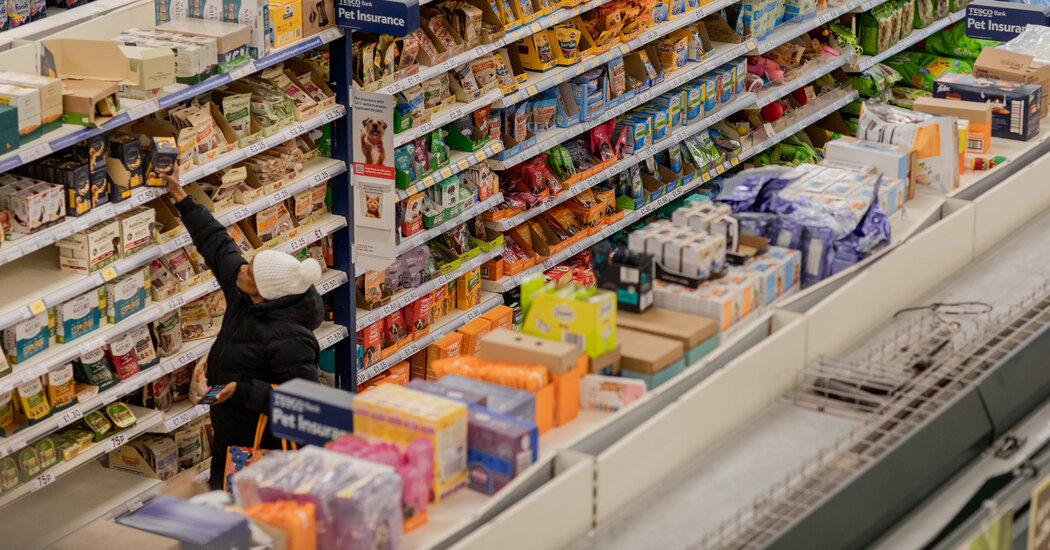Britain’s cost-of-living crisis deepened in October as consumer prices rose 11.1 percent year-on-year, the highest level in more than 40 years. gas.
The higher-than-expected increase came after annual inflation reached 10.1 percent in September. On a monthly basis, the consumer price index increased by 2 percent from September to October.
Despite a government bailout designed to protect households and businesses from the scourge of skyrocketing utility bills, gas and electricity prices were the biggest driver behind the sharp rise in consumer prices, according to the Office for National Statistics. The price of food also rose for the 15th straight month as supermarkets continued to pass on increases in production costs.
“Incredibly, consumer prices rose 2 percent in one month, matching the Bank of England’s target for price increases over the course of a full year,” Jake Finney, an economist at PwC, said in a note.
Inflation in Britain again exceeded that in the eurozone, triggering the worst cost-of-living crisis in four decades. It comes as households and businesses grapple with the prospect of a prolonged recession. The UK economy contracted 0.2 percent from July to September compared to the previous three months, and central bankers have warned of a “prolonged” recession that could last up to two years.
Continued cost increases are of particular concern to businesses, including thousands of small businesses that are the backbone of the UK economy. “Inflation has continued to rise, rather than peaking,” the British Chambers of Commerce said in a statement. “We speak to thousands of companies who tell us this is unsustainable.”
A broader recession is expected to spread to the continent by the end of the year, with countries from France to Finland dealing a double whammy of rising inflation and slowing or declining growth. The Russian war in Ukraine and the retaliatory sanctions against Russia by European countries have caused fuel, food and fertilizer prices to soar worldwide.
Wages in Britain rose 5.7 percent in the third quarter, the fastest pace in 20 years, as people returned to work following the end of Britain’s pandemic lockdowns. But inflation is rising so fast that it is outpacing those gains, leaving households struggling to keep up.
And part of the employment gains mask an underlying uncertainty, with many people returning to the labor market as self-employed. Adjusted for rising prices, wages fell by a total of 2.7 percent in September.
To reduce inflation, the Bank of England is trying to curb economic growth with a series of rate hikes. Earlier this month, the central bank raised interest rates by three-quarters of a point to 3 percent, the highest since 2008. Analysts at ING said the bank was likely to raise rates by another half a point in December.
But the moves have put further financial pressure on homeowners who are already worried about rising costs as they keep mortgage rates high and an economy that is already slowing is cooling. The costs of housing and household services rose by more than 26 percent in October compared to a year ago.
Inflation should slowly begin to decline from next year as energy costs peak, research firm Pantheon Macroeconomics said in a note to clients. But the overall cost of living and business will “remain extremely dependent on the government’s approach to lowering energy prices,” the company said.
The UK economy is also suffering from a series of self-inflicted injuries at the hands of the ruling Conservative Party. The Prime Minister, Rishi Sunak, has made it clear that he intends to tighten up on public finances after a period of turmoil under the previous leader, Liz Truss, who spearheaded economic policy during a short-lived tenure that left Britain in financial trouble . restlessness.
On Thursday, Mr Sunak and Chancellor of the Exchequer, Jeremy Hunt, are expected to announce tax increases and spending cuts, along with a plan to reduce UK debt.
The statement is expected to detail spending and tax policies in line with reducing UK debt. It will be accompanied by forecasts from the Office for Budget Responsibility, an independent government watchdog that will assess the impact of government policies on the economy and public finances.

